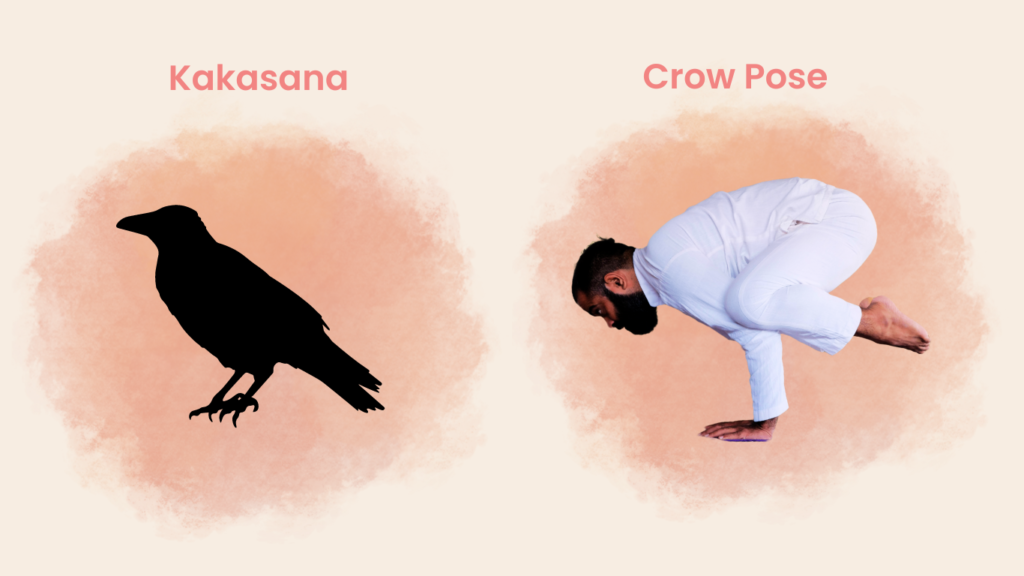-
-
Yoga Courses
Yoga Teacher Training India
Yoga Teacher Training Canada
Yoga Teacher Training Germany
Yoga Teacher Training Greece
Yoga Teacher Training Portugal
-
Yoga Retreats
-
YTTC Guide

Sanskrit: काकासन
Kakasana, or Crow Pose, is one of the foundational arm balancing postures in yoga. The name “Kakasana” is derived from the Sanskrit words “kaka,” meaning crow, and “asana,” meaning pose. This posture mimics the shape and stance of a crow perched on a branch, symbolizing the balance, focus, and lightness required to perform the pose.
Kakasana is often considered a gateway to more advanced arm balances. The pose not only challenges physical strength and coordination but also cultivates mental focus and concentration. It is a metaphor for the yogi’s journey—balancing the various aspects of life with grace and steadiness.
– Begin by squatting down with your knees wide apart.
– Place your hands on the floor in front of you, between your legs shoulder-width apart, with fingers spread wide for stability. Turn the hands outward, so that your index finger points to the front.
– Bend your elbows slightly and place the inside of your knees on the backs of your upper arms.
– Engage your abdominals and pelvic floor and lift your hips up. Come on your toes.
– Slowly shift your weight onto your hands.
– Look slightly forward to help maintain your balance and prevent rolling forward onto your head.
– Once your weight is balanced on your hands, start by lifting one foot off the ground, then the other. Point your toes and bring your feet together to increase stability..
– Engage your core muscles, keep your elbows over your wrists and keep your gaze forward.
– Hold the pose for 5-10 breaths, maintaining steady and even breathing.
– To come out of the pose, slowly lower your feet back to the ground and return to the squat position.
– Kakasana builds significant strength in the arms, shoulders, and wrists, preparing the body for more advanced arm balances.
– The pose requires strong core engagement, which helps in toning and stabilizing the abdominal muscles and the pelvic floor.
– Balancing on the hands improves overall body coordination and spatial awareness.
– The concentration required to hold the pose helps in improving mental focus and mindfulness.
– It provides a gentle stretch to the upper back, relieving tension and improving flexibility.
– Mastering Kakasana serves as a foundation for more challenging arm balances and inversions.
– Individuals with wrist pain or conditions like carpal tunnel syndrome should avoid this pose or practice with caution.
– Those with shoulder injuries or instability should refrain from performing Kakasana.
– Pregnant women should avoid arm balances like Kakasana due to the abdominal pressure.
– The pose may not be suitable for individuals with high blood pressure due to the physical strain involved.
– Anyone recovering from recent surgeries, especially in the abdominal or shoulder areas, should avoid this pose.
– Place a yoga block under your feet to elevate your hips, making it easier to shift your weight onto your hands.
– Perform the pose near a wall for added security and to prevent forward falls.
– Focus on engaging the core muscles to stabilize your body and maintain balance.
– Place a bolster in front of you to allow for cushioning if falling and/or to rest the head.
– Progress gradually and don’t rush into lifting both feet off the ground until you feel confident and stable.
Learn Other Poses:
Popular Courses in Bali
200 hour Yoga Teacher Training in Bali | 300 hour Yoga Teacher Training in Bali | 500 hour Yoga Teacher Training in Bali | 50 Hours Yin Yoga Training in Bali | 50 hours Pranayama Training in Bali | 50 hours Yoga Nidra Training Bali | 50 hours Arm Balancing Training Bali | 100 hour Ashtanga Training Bali
Popular Courses in Germany
200 hour Yoga Teacher Training in Germany | 300 hour Yoga Teacher Training Germany | 50 Hour Yin Yoga Training Germany | 50 Hour Pranayama Training Germany | 50 hour Yoga Nidra Training Germany | 50 Hour Arm Balancing Training | 100 hour Ashtanga Training Germany